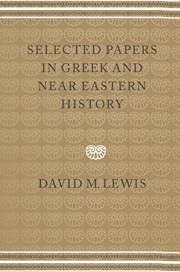Book contents
- Frontmatter
- Contents
- List of plates
- Preface
- Systems of reference
- GENERAL
- ATHENIAN
- 9 Public property in the city
- 10 Cleisthenes and Attica
- 11 Review of J. S. Traill, The Political Organization of Attica
- 12 Review of P. Siewert, Die Trittyen Attikas und die Heeresreform des Kleisthenes
- 13 The Kerameikos ostraka
- 14 Megakles and Eretria
- 15 The Athenian Coinage Decree
- 16 Athena's robe
- 17 The treaties with Leontini and Rhegion
- 18 Entrenchment-clauses in Attic decrees
- 19 Apollo Delios
- 20 After the profanation of the Mysteries
- 21 Aristophanes and politics
- 22 Who was Lysistrata?
- 23 A note on IG i2114 [= i3105]
- 24 The epigraphical evidence for the end of the Thirty
- 25 The financial offices of Eubulus and Lycurgus
- 26 The dating of Demosthenes' speeches
- 27 Law on the Lesser Panathenaia
- 28 The Athenian Rationes Centesimarum
- 29 The chronology of the Athenian New Style Coinage
- 30 Review of M. Thompson, The New Style Silver Coinage of Athens
- NEAR EASTERN
- Bibliography
- Publications of David M. Lewis
- Indexes
28 - The Athenian Rationes Centesimarum
Published online by Cambridge University Press: 15 January 2010
- Frontmatter
- Contents
- List of plates
- Preface
- Systems of reference
- GENERAL
- ATHENIAN
- 9 Public property in the city
- 10 Cleisthenes and Attica
- 11 Review of J. S. Traill, The Political Organization of Attica
- 12 Review of P. Siewert, Die Trittyen Attikas und die Heeresreform des Kleisthenes
- 13 The Kerameikos ostraka
- 14 Megakles and Eretria
- 15 The Athenian Coinage Decree
- 16 Athena's robe
- 17 The treaties with Leontini and Rhegion
- 18 Entrenchment-clauses in Attic decrees
- 19 Apollo Delios
- 20 After the profanation of the Mysteries
- 21 Aristophanes and politics
- 22 Who was Lysistrata?
- 23 A note on IG i2114 [= i3105]
- 24 The epigraphical evidence for the end of the Thirty
- 25 The financial offices of Eubulus and Lycurgus
- 26 The dating of Demosthenes' speeches
- 27 Law on the Lesser Panathenaia
- 28 The Athenian Rationes Centesimarum
- 29 The chronology of the Athenian New Style Coinage
- 30 Review of M. Thompson, The New Style Silver Coinage of Athens
- NEAR EASTERN
- Bibliography
- Publications of David M. Lewis
- Indexes
Summary
Even in Athens, our understanding of matters to do with landholding is imperfect. I discuss here a group of texts which raise problems which are interesting and intractable.
The number of fragments of stone with which we are concerned is fifteen, which have gradually accumulated. They have been shamefully neglected; their bibliography is short, and, with some major exceptions, unhelpful. Their basic pattern is clear. They name sellers, the designation of the real property sold, the purchasers and the price they paid. When the sellers only sell one property, the note EκαΤoσΤή followed by 1 per cent of the price, exactly calculated, follows. When they sell more than one, their entry ends with a total and then the EκαΤoσΤή on that. In two places only, totals appear which evidently cover a group of individual sellers. These too are followed by the EκαΤoσΤή.
One such fragment was known to Boeckh,2 from a slightly inaccurate copy. Apart from some unlucky tinkering with badly read figures, his contribution was to make the association of the text with the fragment of Theophrastus3 which says that at Athens you have to register a sale of property with the magistrate not less than sixty days before completion and that the purchaser has to put down a EκαΤoσΤή of the price so that there shall be an opportunity for anyone to dispute the transaction and that the legal purchaser may be clear by reason of his payment. I do not wish to discuss this fragment, though it would be pleasant to be sure whether it is the seller or the state who gets the EκαΤoσιή,
- Type
- Chapter
- Information
- Selected Papers in Greek and Near Eastern History , pp. 263 - 293Publisher: Cambridge University PressPrint publication year: 1997



